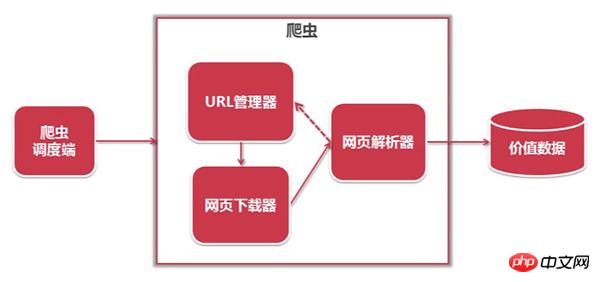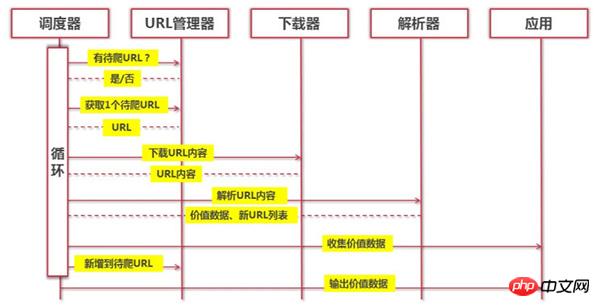What is a python crawler? Why is python called a crawler?
Today we will explain the basic conceptual knowledge of python. Many friends who are new to python have many questions. What is a python crawler? Then why is python called a crawler?
What is a python crawler?
Before entering the article, we first need to know what a crawler is. A crawler, that is, a web crawler, can be understood as a spider crawling on the Internet. The Internet is like a big web, and a crawler is a spider crawling around on this web. If it encounters its prey ( resources required), then it will grab it. For example, if it is crawling a web page, and it finds a path in this web, which is actually a hyperlink pointing to the web page, then it can crawl to another web page to obtain data. If it is not easy to understand, you can actually understand it through the following picture:

Because of the scripting characteristics of python, python is easy to configure. The processing of characters is also very flexible, and python has a rich network crawling module, so the two are often linked together. Python crawler development engineers start from a certain page of the website (usually the home page), read the content of the web page, find other link addresses in the web page, and then use these link addresses to find the next web page. This cycle continues until this Until all web pages of the website have been crawled. If the entire Internet is regarded as a website, then web spiders can use this principle to crawl all web pages on the Internet.
Crawlers can crawl the content of a website or application and extract useful value. You can also simulate user operations on browsers or App applications to implement automated procedures. The following behaviors can be achieved with crawlers:
vote-grabbing artifact
voting artifact
Prediction (stock market prediction , box office prediction)
National Sentiment Analysis
Social Relationship Network
As mentioned above, we can think that
crawlers generally refer to the crawling of network resources, and because Python's scripting features are not only easy to configure, but also very flexible in character processing. In addition, Python has rich web crawling modules, so the two are often linked together. This is why python is called a crawler.
Why is python called a crawler? As a programming language, Python is pure free software. It is deeply loved by programmers for its concise and clear syntax and forced use of whitespace characters for statement indentation. . To give an example: to complete a task, a total of 1,000 lines of code need to be written in C language, 100 lines of code in Java, and only 20 lines of code in Python. If you use Python to complete programming tasks, you will write less code, and the code will be concise, short, and more readable. When a team is developing, it will be faster to read other people's code, and the development efficiency will be higher, making the work more efficient.
This is a programming language that is very suitable for developing web crawlers, and compared to other static programming languages, Python’s interface for grabbing web documents is simpler; compared to other dynamic script languages, Python’s urllib2 package Provides a relatively complete API for accessing web documents. In addition, there are excellent third-party packages in python that can efficiently implement web page crawling, and can complete the tag filtering function of web pages with very short codes.
The structure of the python crawler is as follows:
 ##1. URL manager: manages the URLs to be crawled Collection and crawled URL collection, send the URL to be crawled to the web page downloader;
##1. URL manager: manages the URLs to be crawled Collection and crawled URL collection, send the URL to be crawled to the web page downloader;
#2. Web page downloader: crawl the web page corresponding to the URL and store it as a string. Send it to the web page parser;
3. Web page parser: parse out valuable data, store it, and add the url to the URL manager.
The workflow of python is as follows:
 (The Python crawler determines whether there is a URL to be crawled through the URL manager. If there is a URL to be crawled, it is passed to the downloader through the scheduler, the URL content is downloaded, and sent to the parser through the scheduler, the URL content is parsed, and the value data and new URL list are passed to the application through the scheduler, and the value is output Information process.)
(The Python crawler determines whether there is a URL to be crawled through the URL manager. If there is a URL to be crawled, it is passed to the downloader through the scheduler, the URL content is downloaded, and sent to the parser through the scheduler, the URL content is parsed, and the value data and new URL list are passed to the application through the scheduler, and the value is output Information process.)
Python is a programming language that is very suitable for developing web crawlers. It provides modules such as urllib, re, json, pyquery, etc., and it also has many established frameworks, such as Scrapy framework, PySpider crawler system, etc., which itself is very It is simple and convenient, so it is the preferred programming language for web crawlers! I hope this article can provide some help to friends who have just come into contact with the python language.
The above is the detailed content of What is a python crawler? Why is python called a crawler?. For more information, please follow other related articles on the PHP Chinese website!

Hot AI Tools

Undresser.AI Undress
AI-powered app for creating realistic nude photos

AI Clothes Remover
Online AI tool for removing clothes from photos.

Undress AI Tool
Undress images for free

Clothoff.io
AI clothes remover

Video Face Swap
Swap faces in any video effortlessly with our completely free AI face swap tool!

Hot Article

Hot Tools

Notepad++7.3.1
Easy-to-use and free code editor

SublimeText3 Chinese version
Chinese version, very easy to use

Zend Studio 13.0.1
Powerful PHP integrated development environment

Dreamweaver CS6
Visual web development tools

SublimeText3 Mac version
God-level code editing software (SublimeText3)

Hot Topics
 1664
1664
 14
14
 1423
1423
 52
52
 1317
1317
 25
25
 1268
1268
 29
29
 1246
1246
 24
24
 Python vs. C : Applications and Use Cases Compared
Apr 12, 2025 am 12:01 AM
Python vs. C : Applications and Use Cases Compared
Apr 12, 2025 am 12:01 AM
Python is suitable for data science, web development and automation tasks, while C is suitable for system programming, game development and embedded systems. Python is known for its simplicity and powerful ecosystem, while C is known for its high performance and underlying control capabilities.
 Python: Games, GUIs, and More
Apr 13, 2025 am 12:14 AM
Python: Games, GUIs, and More
Apr 13, 2025 am 12:14 AM
Python excels in gaming and GUI development. 1) Game development uses Pygame, providing drawing, audio and other functions, which are suitable for creating 2D games. 2) GUI development can choose Tkinter or PyQt. Tkinter is simple and easy to use, PyQt has rich functions and is suitable for professional development.
 Python vs. C : Learning Curves and Ease of Use
Apr 19, 2025 am 12:20 AM
Python vs. C : Learning Curves and Ease of Use
Apr 19, 2025 am 12:20 AM
Python is easier to learn and use, while C is more powerful but complex. 1. Python syntax is concise and suitable for beginners. Dynamic typing and automatic memory management make it easy to use, but may cause runtime errors. 2.C provides low-level control and advanced features, suitable for high-performance applications, but has a high learning threshold and requires manual memory and type safety management.
 The 2-Hour Python Plan: A Realistic Approach
Apr 11, 2025 am 12:04 AM
The 2-Hour Python Plan: A Realistic Approach
Apr 11, 2025 am 12:04 AM
You can learn basic programming concepts and skills of Python within 2 hours. 1. Learn variables and data types, 2. Master control flow (conditional statements and loops), 3. Understand the definition and use of functions, 4. Quickly get started with Python programming through simple examples and code snippets.
 Python and Time: Making the Most of Your Study Time
Apr 14, 2025 am 12:02 AM
Python and Time: Making the Most of Your Study Time
Apr 14, 2025 am 12:02 AM
To maximize the efficiency of learning Python in a limited time, you can use Python's datetime, time, and schedule modules. 1. The datetime module is used to record and plan learning time. 2. The time module helps to set study and rest time. 3. The schedule module automatically arranges weekly learning tasks.
 Python: Exploring Its Primary Applications
Apr 10, 2025 am 09:41 AM
Python: Exploring Its Primary Applications
Apr 10, 2025 am 09:41 AM
Python is widely used in the fields of web development, data science, machine learning, automation and scripting. 1) In web development, Django and Flask frameworks simplify the development process. 2) In the fields of data science and machine learning, NumPy, Pandas, Scikit-learn and TensorFlow libraries provide strong support. 3) In terms of automation and scripting, Python is suitable for tasks such as automated testing and system management.
 Python vs. C : Exploring Performance and Efficiency
Apr 18, 2025 am 12:20 AM
Python vs. C : Exploring Performance and Efficiency
Apr 18, 2025 am 12:20 AM
Python is better than C in development efficiency, but C is higher in execution performance. 1. Python's concise syntax and rich libraries improve development efficiency. 2.C's compilation-type characteristics and hardware control improve execution performance. When making a choice, you need to weigh the development speed and execution efficiency based on project needs.
 Python: Automation, Scripting, and Task Management
Apr 16, 2025 am 12:14 AM
Python: Automation, Scripting, and Task Management
Apr 16, 2025 am 12:14 AM
Python excels in automation, scripting, and task management. 1) Automation: File backup is realized through standard libraries such as os and shutil. 2) Script writing: Use the psutil library to monitor system resources. 3) Task management: Use the schedule library to schedule tasks. Python's ease of use and rich library support makes it the preferred tool in these areas.




